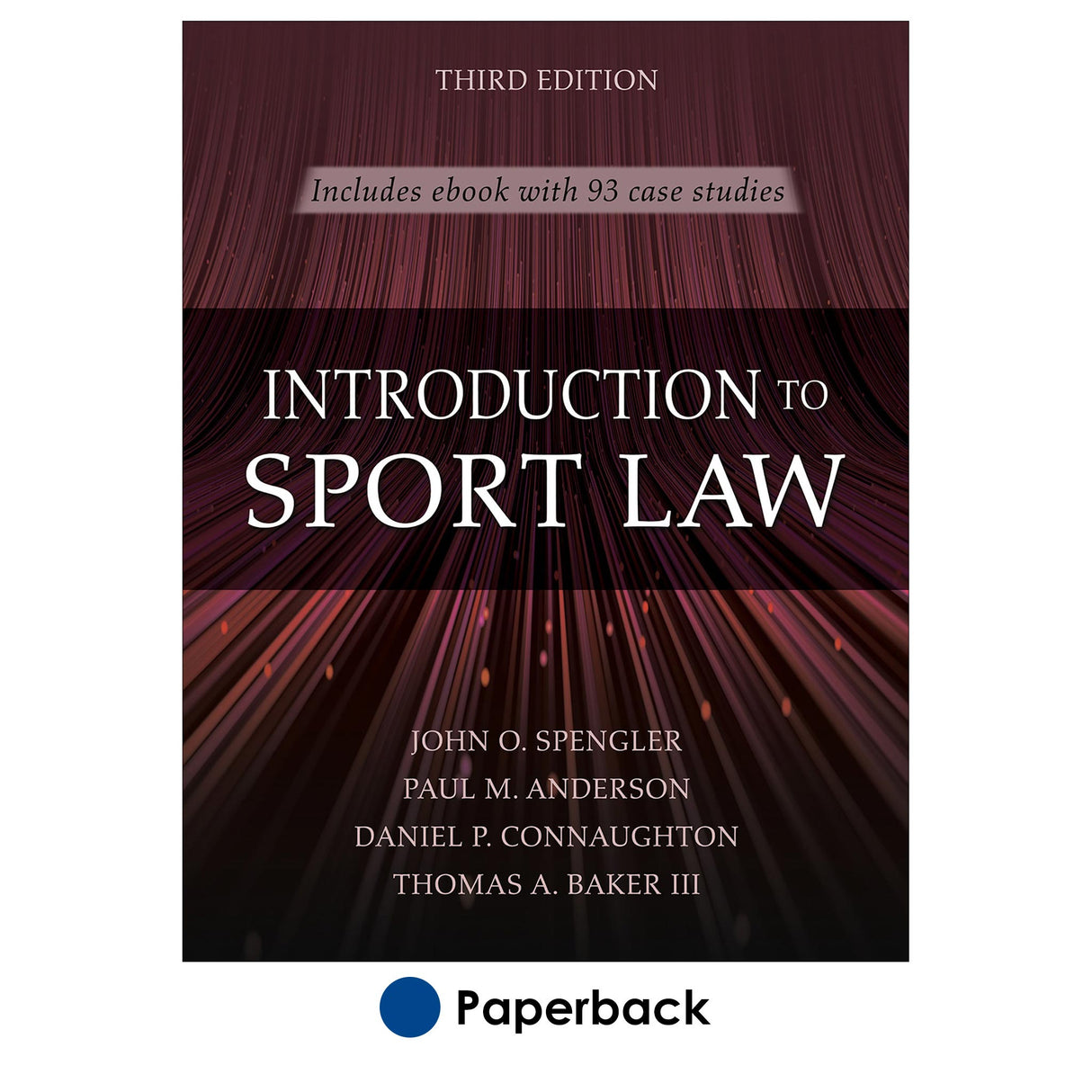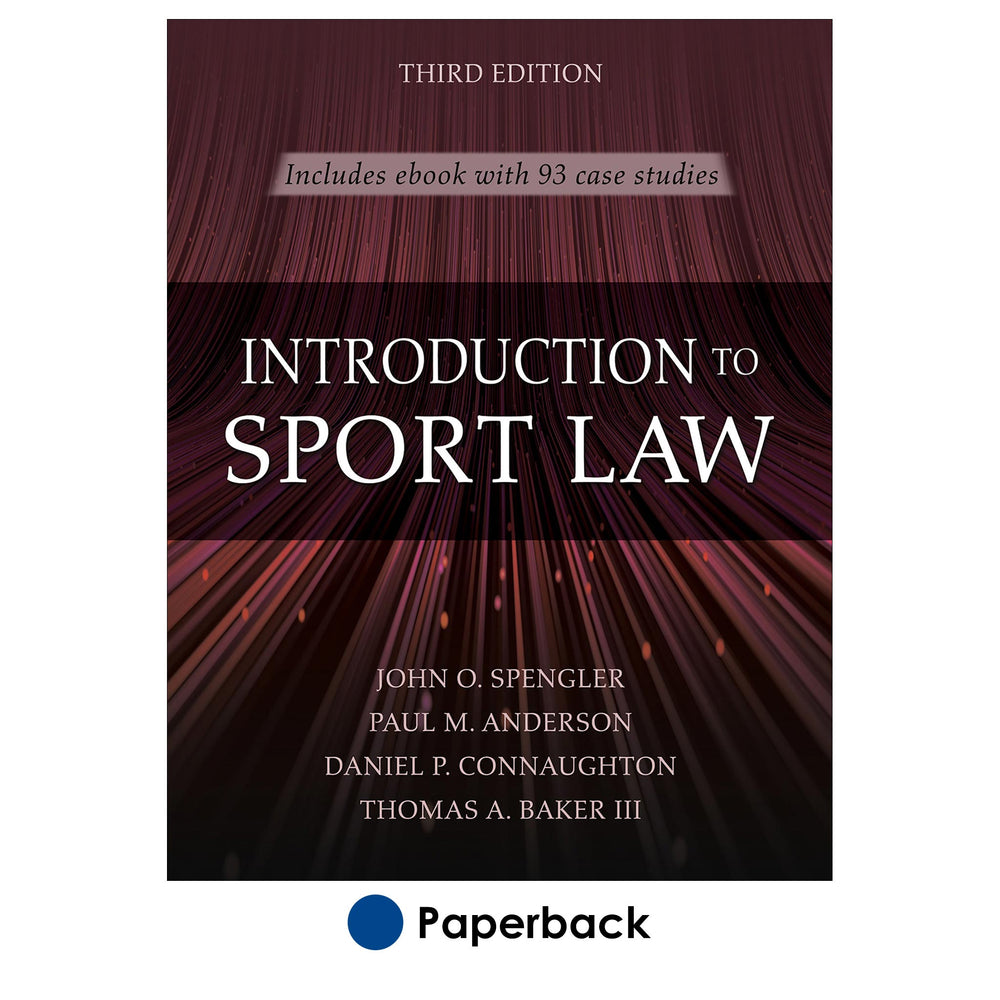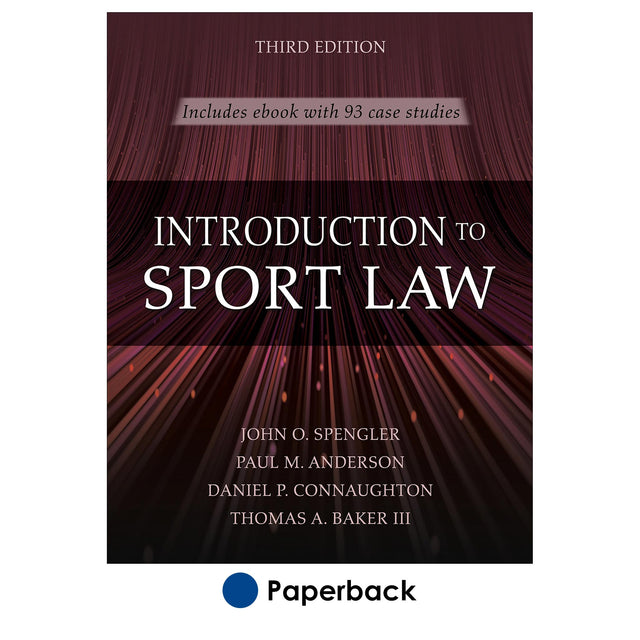Introduction to Sport Law With Case Studies in Sport Law-3rd Edition
$134.00 USD
Organized to cover all law categories that are most critical to the management of sport, the text first presents an overview of the United States legal system, including the court system, the various types of law, and legal resources. Students will then explore important topics such as risk management, employment law, gender equity, intellectual property, and constitutional law, examining the relevance of the law at hand to real-world applications across the field of sport management.
This updated third edition allows students to increase their comprehension by looking at laws and issues through timely, modern points of view. New content reflects important topics and current legal issues, including the Equal Pay Act; the Sports Broadcasting Act; athlete safety and equipment concerns; name, image, and likeness (NIL) laws; antitrust litigation, unionization, and collective bargaining; and transgender athlete participation in sport. The updated content addresses contemporary challenges to constitutional law, including the First Amendment and Fourteenth Amendment, and it examines how budget problems related to COVID-19 resulted in cutting sports and raised Title IX issues.
End-of-chapter discussion questions and In the Courtroom sidebars have been updated with current examples to better demonstrate modern applied perspectives. Moot Court Case sidebars now have accompanying questions on hypothetical scenarios, allowing students to understand the technicalities of sport law in practical application.
Each chapter of Introduction to Sport Law, Third Edition, also directs students to relevant cases in the included ebook, Case Studies in Sport Law, Third Edition, by Andrew T. Pittman, John O. Spengler, and Sarah J. Young. Featuring abridged versions of 93 court cases, all carefully curated to provide real-life applications representing many of the multifaceted aspects of sport law, the ebook also includes review questions for each case to test comprehension and prompt in-class discussion.
Through its focus on legal concepts with direct application to the world of sport, Introduction to Sport Law, Third Edition, provides students with the information they need to feel confident with the fundamentals of sport law.
Note: A code for accessing the Case Studies in Sport Law, Third Edition, ebook is included with all new print books.
Audience
A textbook for undergraduate and graduate courses in sport law. A reference for libraries; sport administrators; sport officials; event, facility, and sport managers; and attorneys and paralegals researching legal issues in sport.Sources of U.S. Law
Types of U.S. Law
U.S. Court System
Legal Resources
Learning Aids
Chapter 2. Tort Law and Product Liability
Negligence
Intentional Torts
Product Liability
Learning Aids
Chapter 3. Risk Management
Perspectives on Approaching Risk Management
Loss Prevention and Risk Management
Risk Management Process
Maintaining and Providing Proper Equipment and Premises
Instruction and Supervision
Risk Management Applications
Learning Aids
Chapter 4. Agency Law
Sport Agents
Concepts in Agency Law
Regulation of Athlete Agents
Consolidation
Disputes
Name, Image, and Likeness (NIL) and Agents
Learning Aids
Chapter 5. Contract Law
Basics of Contract Law
Sport Contracts
Contract Law Issues
Learning Aids
Chapter 6. Employment Law
Employment Relationship
Discrimination
Sexual Harassment
Federal Employment Laws
Learning Aids
Chapter 7. Constitutional Law
First Amendment
Fourteenth Amendment
Fifth Amendment
Learning Aids
Chapter 8. Gender Equity
Title IX
Sexual Harassment
Sexual Orientation
Employment Discrimination
Learning Aids
Chapter 9. Intellectual Property Law
Trademark Law
Copyright Law
Right of Publicity
Name, Image, and Likeness (NIL) Rights
Patent Law
Ambush Marketing
Learning Aids
Chapter 10. Antitrust Law
Federal Antitrust Laws
Application to Professional Team Sports
Application to Individual Performer Sports
Application to College Sports
Learning Aids
Chapter 11. Labor Law
Development of Labor Law in the United States
Unionization of American Professional Sports Teams
Right to Bargain Collectively
Right to Engage in Concerted Activities
Prohibited Conduct Under the NLRA: Unfair Labor Practices
Learning Aids
Name, image, and likeness (NIL) rights
Transgender student-athlete participation in sport
All ancillaries are free to adopting instructors through HKPropel.
Instructor guide. Includes chapter overviews, group projects to encourage critical thinking, teaching aids, tips, paper topics, and solutions and recommended responses to the Moot Court Case and discussion questions from the chapters, as well as instructions for using the Moot Court Case sidebars found in the text. Also included is a case finder to incorporate the court cases from the companion ebook, Case Studies in Sport Law, Third Edition, allowing students to examine real-world applications of theories and ideas throughout the text. In addition, instructors will have access to a second instructor guide specifically created for Case Studies in Sport Law, Third Edition, which includes answers to review questions found at the end of each chapter.
Test package. Contains 20 questions per chapter in true-false, fill-in-the-blank, essay and short-answer, and multiple-choice formats. The files may be downloaded for integration with a learning management system or printed for use as paper-based tests.
Presentation package. Features nearly 300 PowerPoint slides of text from the book that can be used for class discussion and presentation. The slides in the presentation package can be used directly within PowerPoint or printed to make handouts for students. Instructors can easily add, modify, and rearrange the order of the slides.





